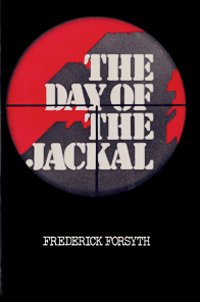
When Frederick Forsyth wrote The Day of the Jackal, it was a shot in the dark. The writer had produced a factual book about the war in Biafra, which took place in the late 1960s, but it hadn’t done too well. His stab at a thriller was undertaken to address his financial problems. Not only did this 1971 release perform better than anticipated, it set the author on the way to becoming one of the leading crime writers of the late 20th century. In 1972, The Day of the Jackal won the Edgar Award for Best Novel from the Mystery Writers of America. And its impact has been long lasting. In 2012, Frederick Forsyth was handed a Diamond Dagger – the UK Crime Writers’ Association equivalent of a lifetime achievement award.
To continue with the accolades, earlier this year, The Folio Society honoured this groundbreaking book with a specially illustrated and carefully bound reprint. Now, The Folio Society only does this when a book is particularly special, and this edition comes as a high quality hardback in a classy slipcase. Through a die-cut hole in the case one can see the silhouette of Charles de Gaulle, the intended victim of The Jackal. Slip the book out, and we see in the cover illustration that the general is a reflected in sunglasses worn, presumably, by the terrorist assassin who is out to eliminate him.

The Folio Society’s effort is a fantastic way to enjoy The Day of the Jackal, right down to the smell of the ink on the paper. So we decided to take a closer look at the classic book and investigate why it’s so wonderful, and what influence it’s had on the development of political and espionage thrillers, as well as the wider crime genre.
To kill de Gaulle
Firstly, there is the storyline which begins with a real-world premise. What might happen if someone tried to take down France’s powerful national leader of the day, Charles de Gaulle?
The book reflects France’s state of post-colonial meltdown at the time. Its involvement in Indochina ended ignominiously in 1954 with military defeat at Dien Bien Phu. Still, France had a huge military and diplomatic presence across North Africa, but particularly in Algeria. As Algerian nationalism grew, so did a huge resentment among the traditional French military class. When Charles de Gaulle returned as President in 1959, the old soldiers were convinced that the man who had led France, in exile, through the dark hours of WWII, would lead the Republic to another victory against the Algerian Nationalists. When de Gaulle’s political instinct overcame his warrior spirit, he instantly became a hate figure for the Far Right.
There was in fact a plot against de Gaulle, and an attempt was made on his life in 1962 by a disgruntled air force weapons engineer. Similarly, in Forsyth’s novel a group of bitter former soldiers called Organisation de l’armée secrète are determined to get rid of de Gaulle by fair means or foul. In his story, the malcontents employ a shadowy English hitman who operates under a plethora of assumed names. They give him the codename The Jackal.

We follow the man who has assumed the identity of Charles Calthrop as he commissions a special rifle, tests it, and then plans his assault on the French president. Nothing is left to chance, and there are several innocent victims who perish as The Jackal drives north for his fatal rendezvous in the French capital. Many will be familiar with the story, if only through the 1973 movie, directed by Fred Zinnemann, and starring Edward Fox.
Time will tell
Has The Day of the Jackal stood the test of time? Emphatically yes. The writing is compelling, insistent and constantly driven by the journalistic expertise of the author. As noted above, Forsyth had covered the horrors of the breakaway Nigerian region of Biafra as a journalist, and it is through this experience that he was able to write so convincingly about weaponry, and the role of the mercenary in foreign wars. Is the narrative gripping, even though we know de Gaulle was not assassinated in the end? Absolutely, because it is only in the final few pages that we discover how The Jackal’s impeccable planning comes to grief.
However, in addition to being an outstanding read, Forsyth’s masterpiece also set the ground rules for subsequent political thrillers. Firstly, the technical research set the bar high for imitators. Guns, transport and political background all had to be impeccably researched by post-Jackal writers such as Jack Higgins, Ken Follett, Tom Clancy and Andy McNab. “It is a perfect example of the adventure story,” says Robert Harris, whose thriller An Officer and a Spy, based on the Dreyfus Affair, belongs in the same tradition. Harris concludes, “It is very well written, entirely believable, with this intriguing, enigmatic character at its centre.”

In one sense, Forsyth (right) broke new ground, in that the events in his book were just a whisker away from reality. De Gaulle and his wife survived the assassination attempt which was planned by the real-life versions of the OAS plotters in the book. It’s no coincidence that newspapers looking to hang a snappy name on the Venezuelan terrorist Ilich Ramírez Sánchez during the mid-70s decided that he would be called Carlos The Jackal. And, it is a macabre fact that the Hebrew translation of The Day Of The Jackal was found in the personal possessions of Yigal Amir, who assassinated the Israeli leader Yitzhak Rabin in November 1995.
Wonderfully authentic, plausible down to the last tiny physical detail, and with a narrative drive which goes way, way beyond mere reporting, The Day Of The Jackal remains the brightest and best example of a political thriller. Critics may argue the toss as to whether Forsyth created the genre. There were honourable predecessors such as Richard Condon’s 1959 classic The Manchurian Candidate, but there will few who disagree with the statement that the Kent-born writer set the benchmark against which all successive stories would be judged.











An excellent article. I remember reading “The Day of the Jackal” soon after it was released, and I was enthralled by it. It’s also one of the few books that has had a faithful adaptation as a movie and have the film be just as thrilling as the book.